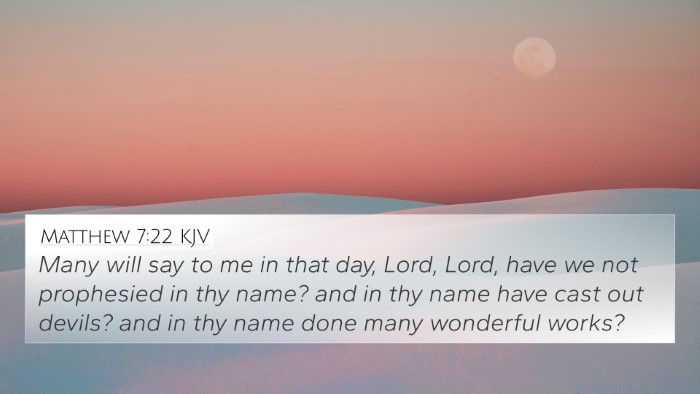Understanding Luke 12:46
Luke 12:46 states: "The lord of that servant will come in a day when he looketh not for him, and at an hour when he is not aware, and will cut him in sunder, and will appoint him his portion with the unbelievers." This verse emphasizes the importance of vigilance and faithfulness in the service of God. In this commentary, we will explore the meaning of this verse through insights from public domain commentaries.
Commentary Insights
Through the lens of several esteemed biblical scholars, we find a deeper understanding of this poignant scripture.
Matthew Henry's Commentary
Henry explains that this verse warns the servant unprepared for his master's return, indicating a sudden and unexpected judgment. The emphasis on the "day when he looketh not for him" signifies the need for continual readiness in the Christian life. Henry reflects on the accountability of believers, highlighting that neglect in duty results in dire consequences, where those found unworthy are assigned with "the unbelievers."
Albert Barnes' Notes
According to Barnes, this passage serves as a stark reminder of the unpredictability of Christ's return. He reinforces the concept of being spiritually awake and ready for action, as the master will come at an undesired hour. He also notes that the reference to being "cut in sunder" signifies the severity of punishment for unfaithful stewards, linking this accountability to themes of divine justice and holiness.
Adam Clarke's Commentary
Clarke offers insights into the nature of the servant's responsibilities and the consequences of failing to fulfill them. He emphasizes that the "portion with the unbelievers" suggests a separation from the faithful, aligning with broader biblical themes of judgment and reward. Clarke also points out the significance of this urgency, as it incites believers to constantly engage in their duties towards God and neighbor.
Bible Verse Cross-References
This verse is intricately connected to various other scriptures that echo its themes of judgment, readiness, and accountability. Here are some pertinent cross-references:
- Matthew 24:50-51 - Portrays the master of the house returning and punishing the servant who was not ready.
- 1 Thessalonians 5:2-3 - Discusses the suddenness of the Day of the Lord, emphasizing vigilance among believers.
- Luke 21:36 - Encourages prayer and watchfulness to escape the trials to come.
- 2 Peter 3:10 - Speaks to the Day of the Lord coming like a thief in the night, stressing the unexpected nature of divine judgment.
- Matthew 25:10 - The parable of the ten virgins, illustrating preparedness for the bridegroom's arrival.
- Revelation 3:3 - A call to remember and hold fast to what one has received, lest they be caught unawares.
- Romans 14:10-12 - Highlights the personal accountability of each believer before God.
- James 4:14 - Reminds us of the uncertainty of life and the need to prepare for eternal matters.
- Hebrews 10:26-27 - Addresses the consequences of deliberate unfaithfulness in light of the impending judgment.
- Matthew 7:21-23 - Discusses the futility of mere profession without genuine faithfulness.
Thematic Connections
Luke 12:46 invites readers to explore inter-Biblical dialogues through its themes:
- Preparedness: Similar to the teachings in Matthew 25, this verse highlights the necessity of being spiritually alert.
- Accountability: The link between faithfulness to God’s calling and the eventual reckoning we must all face.
- Judgment: Numerous scriptures discuss God's judgment, echoing the weight of actions taken in this life.
- Vigilance: The need for continuous commitment to God, aligning with exhortations in the New Testament.
Conclusion
In conclusion, Luke 12:46 serves as a profound reminder of the importance of vigilance, accountability, and faithfulness. This verse aligns with many other biblical texts, creating a web of connections that enrich our understanding of God's expectations for believers. By engaging in cross-referencing and thematic studies, one can uncover the depths of Scripture and the consistent message of divine stewardship and readiness.
FAQ: How to Use Bible Cross-References
We encourage readers to utilize tools for Bible cross-referencing, such as concordances and study guides, to deepen their understanding and engage in cross-referencing Bible study effectively. Identifying connections between Old and New Testament passages enriches one's spiritual journey and comprehension of God’s Word.













